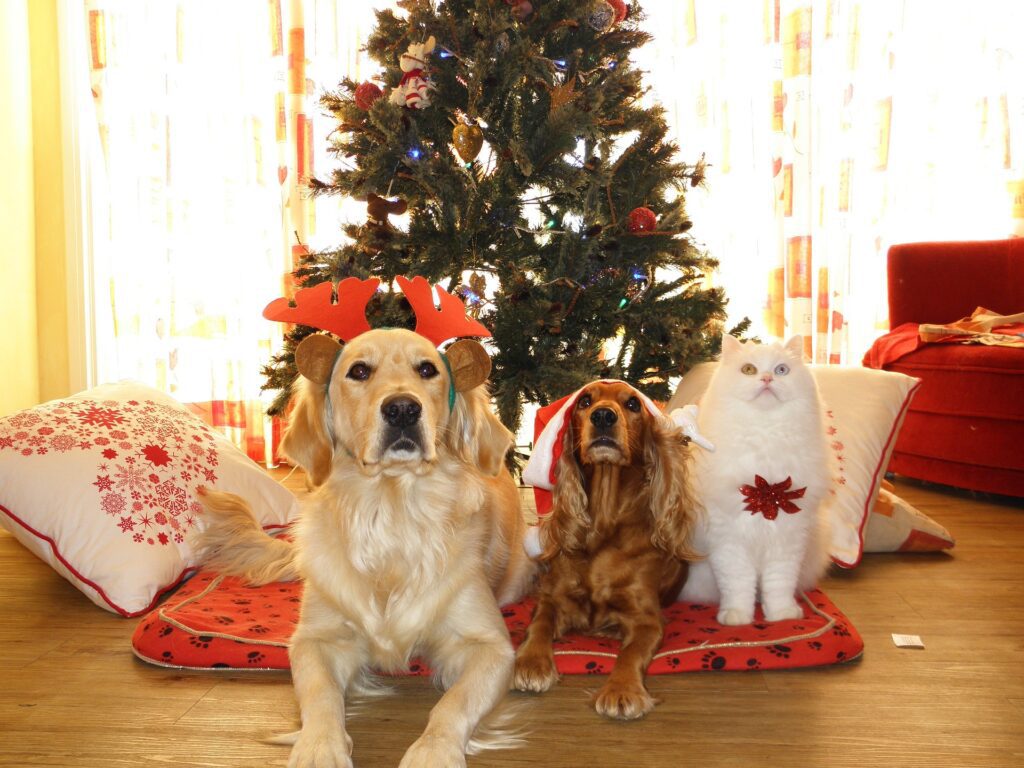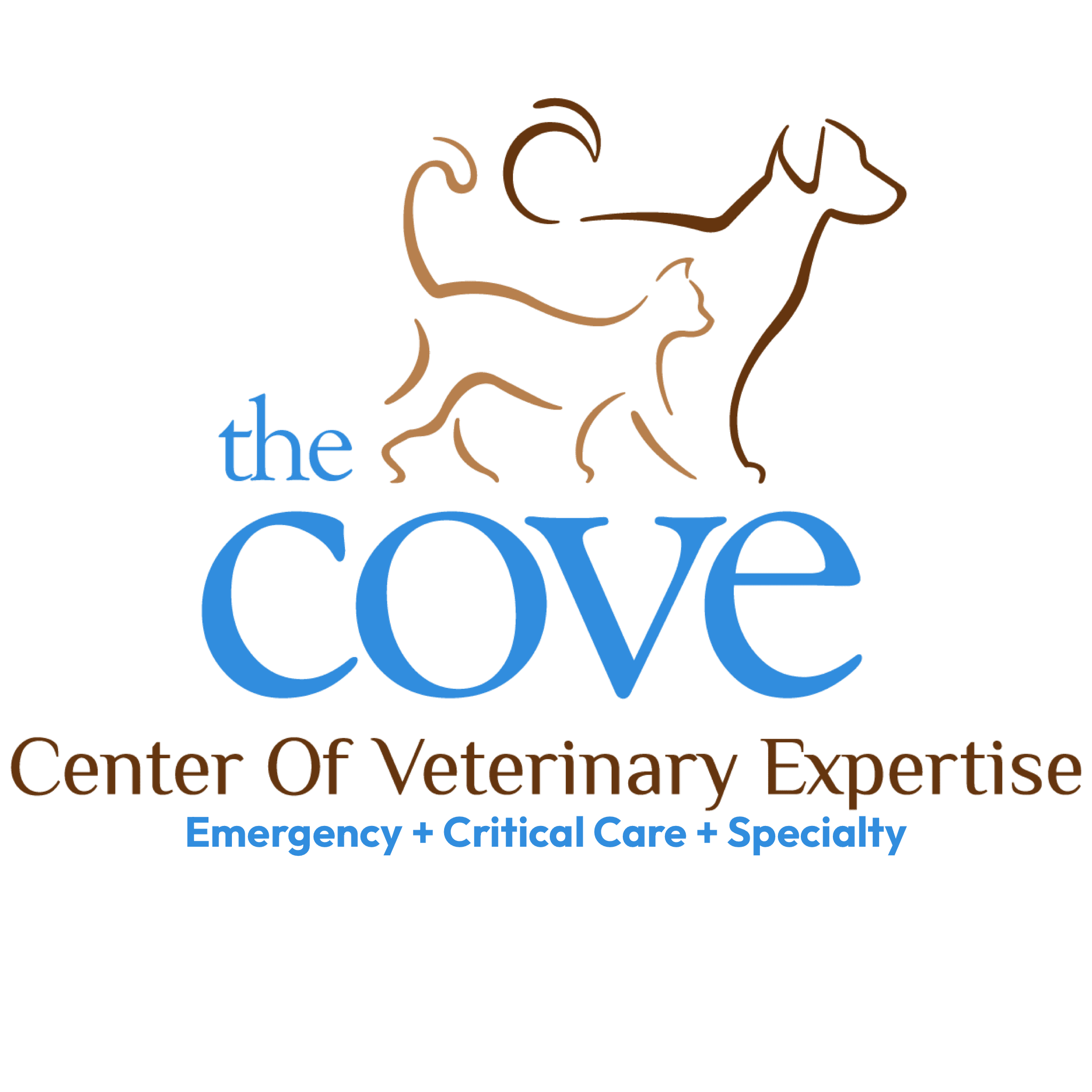Holiday time is family time. And for pet parents, the family wouldn’t be complete without having their furry loved ones close by.
But the holiday season also brings its own set of challenges for pet parents to watch out for. Unfamiliar people in the house or changing vacation schedules can confuse pets. And while decorations and tasty treats are a wonderful holiday tradition, they can cause serious problems for animals.
To help ensure pets enter into 2020 in good health, the expert team The COVE would like to offer a few safety tips to ensure a successful holiday season.
Plan Ahead
With so much going on during the season, it’s a good idea to have a plan in place just in case you need to act quickly. Call your veterinarian’s office to see what their holiday hours are. And make sure you know where the nearest 24/7 emergency animal hospital is located. Keep this information in a visible spot in case you or your pet’s caregiver need it quickly. The COVE is open 24/7 for emergencies. You may reach us anytime at 757-935-9111.
If your dog or cat does require medical attention, have these items nearby:
- A pet first-aid kit at home and in the car.
- A pet insurance plan in place (before you need it)! We understand emergencies are unexpected and can be costly; however, most animal insurance policies cover urgent and advanced medical care.

Secure Your Holiday Decorations
Christmas trees can add a festive spirit to your home. But they can also attract unwanted attention from curious animals. Here are a few things to remember:
- With their colorful ornaments and strings of tinsel, Christmas trees are an alluring playground for many pets. But trees can tip over, so it’s best to anchor them to a wall or ceiling with fishing line. Also, pets might try to sip the water under the tree, so avoid using any preservatives or chemical additives.
- Ornaments can be pet magnets. But the paint can be poisonous! And glass ornaments can break into sharp pieces that can injure your little friend or be swallowed and cause internal blockage. Keep them out of your pet’s reach or put a gate around the tree.
- Holiday-themed plants are beautiful to look at but might result in a trip to the veterinarian if eaten by an animal. Amaryllis, mistletoe, balsam, pine, cedar, lilies, and holly are among the common holiday plants that can be dangerous and poisonous to pets that decide to eat them. Poinsettias can be troublesome, as well. Pet parents might want to consider using artificial plants instead. The ASPCA offers lists of plants that are toxic to dogs and cats.
- Never leave lit candles where a pet can get near it. Pets can easily knock them over. And be sure to snuff out the flames when you leave the room. Better yet, use flameless candles.
- If you’re hosting guests, be sure to save a quiet space in your home for your four-legged friend. They may not appreciate all the celebrating and want to spend a little time by themselves. And if your pet doesn’t do well with other people, alert your guests beforehand so they’ll give your dog or cat a little space and time to get used to having a stranger around.
- Guests, especially children, might forget to close doors. If your pet is an escape artist, make sure all portals to the outside world are secure at all times. Just in case your pet sneaks out, make sure it has proper identification and is microchipped with up-to-date information so when found, they can be returned quickly.
Holiday Food No-Nos
Don’t give your pets human food. This is true all year long, but during the holidays, many homes are filled with sweets and other trimmings that bring extra opportunities for pets to get into mischief.
- Keep all Hanukkah gelt, stocking stuffers, and candy dishes out of your pet’s reach. Chocolate can be toxic and even fatal for both dogs and cats – depending on the size of the pet and the amount eaten. To know how much chocolate is toxic for your dog, try the Chocolate Toxicity Calculator. Baked goods and other sweets often contain artificial sweeteners, like Xylitol, can cause liver failure and death in dogs – even in minimal amounts (often found in peanut butter!). Also, doughy items can cause bloating – so keep Fido out of the kitchen during your holiday baking. If you believe your pet has ingested a dangerous amount of chocolate or any other toxic substances, please seek medical care immediately, or call Animal Poison Control at 888-426-4435.
- Even turkey and side dishes should be avoided. Turkey can cause life-threatening pancreatitis, while other items on your plate like onions, raisins, and grapes, can be poisonous to animals. Make sure to keep your trashcans locked and out of reach too.
Here is a complete list of the top pet holiday toxins from ASPCA.

Travel
Whether you leave your dog or cat with a caretaker while you travel, or take them with you, a few simple precautions will help make it a successful trip for both pets and pet parents.
- Pets in cars should always be secured by a harness or a carrier. And never leave them alone in a car.
- If traveling by air, make sure your pet meets all the requirements issued by the airline. And talk to your veterinarian first to make sure it’s healthy enough for the trip.
- Don’t forget to bring your pet’s favorite food and any medication it may need, as well as copies of their medical records just in case.
- If you board your dog or cat, make sure it’s up to date on all vaccines. And talk to your veterinarian about protecting them from contagious diseases.
This time of year, our ER department sees an increase in wounds from dog fights, since more pet families are out and about. Therefore, please make sure to always keep your dog on a tight leash. When interacting with other animals, it is better to introduce new pets before those crowded and busy social gatherings. If you and your furry loved one are visiting or staying with another pet family, it might be best to keep animals in separate rooms or use a crate or unless they are under direct supervision to avoid scuffles or injuries.
We hope these tips help you and your beloved pets have a safe, happy, and furry holiday season!
THE COVE is Open 24/7/365 and Every Holiday
The COVE is open 24/7 all year long, and we’re here for you to answer any questions or concerns. You can trust in the care of our emergency department, led by Jacqueline Nobles, DVM, DACVECC, a board-certified specialist in emergency and critical care. We are located at 6550 Hampton Roads Pkwy, #113, Suffolk, VA. We welcome your call any time, day or night, at 757-935-9111.
About Us
The COVE’s veterinarians and staff wholeheartedly embrace the core values of community, collaboration, commitment, compassion, and integrity. This focus ensures that pets, the people who love them, and their primary care veterinarians have as positive and affirming a healthcare experience as possible, regardless of the circumstances that bring us all together.
